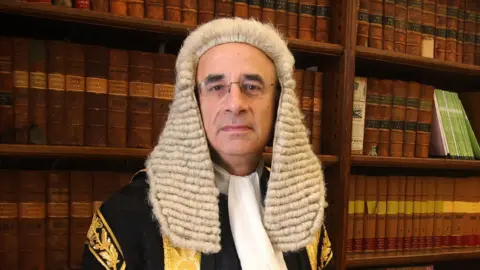Jury-Free Trials Proposed to Alleviate Court Backlog and Prevent “Collapse”
In a significant move to address the escalating crisis within the UK’s criminal court system, a former senior judge has proposed radical reforms, including the controversial recommendation to conduct jury-free trials for a substantial number of cases. Sir Brian Leveson, tasked with reviewing the state of the courts, has issued a stark warning that the current situation is “simply unacceptable” and risks “total system collapse” if immediate and fundamental changes are not implemented.

The report highlights an alarming backlog of nearly 77,000 cases awaiting trial in the Crown Court across England and Wales, leading to agonizingly long waits for justice for both victims and defendants. Some individuals are reportedly waiting years for their cases to be heard, a delay that Sir Brian equates to a denial of justice. His comprehensive review, initiated in December, suggests a multi-faceted approach to streamline the legal process and prevent the courts from buckling under the strain.
Among the key proposals are the expansion of judge-only trials, particularly for complex financial crimes such as fraud and bribery. Sir Brian also advocates for an increased reliance on out-of-court resolutions, like cautions, and the establishment of a new Crown Court division. This division would comprise two magistrates and a judge to handle less severe offenses, thereby alleviating pressure on the existing system. Furthermore, he suggests enhancing sentence reductions for defendants who plead guilty at the earliest opportunity, incentivizing quicker case resolutions.
“Our criminal justice system stands at a critical juncture,” Sir Brian stated, emphasizing that these are not minor adjustments but “fundamental changes that will seek to make the system fit for the 21st century.” He stressed that the proposed reforms are designed to ensure appropriate and fair decision-making while preserving the fundamental right to a fair trial and adapting processes for modern demands.
The recommendations also include reclassifying certain offenses, potentially shifting cases with maximum sentences of two years or less, such as drug possession, bike theft, and voyeurism, to magistrates’ courts. Crucially, individuals accused of offenses like assaulting emergency workers, stalking, or possessing indecent images of children would lose their right to opt for a jury trial.
However, these proposed “radical changes” have not been met with universal approval. Mary Prior KC, chair of the Criminal Bar Association, expressed the need for careful consideration, noting that criminal barristers must believe these reforms are the best way forward. Manisha Knights, a Solicitor Advocate, voiced strong concerns, asserting that the jury system, with its inherent diversity, is “central and pivotal” to justice. She argued that the judiciary’s lack of diversity, compared to juries, makes the right to be tried by one’s peers even more critical and should not be diluted.
Conversely, the Magistrates’ Association has welcomed the review, with national chair Mark Beattie urging the government to implement the recommendations swiftly. “Magistrates are ready and willing to support these and other initiatives aimed at reducing the pressure on Crown Courts,” Beattie stated, underscoring the urgency for victims, witnesses, and defendants waiting for justice.
Echoing these sentiments, Met Police Commissioner Sir Mark Rowley highlighted the dire reality of current delays, citing over 100 trials in London alone listed for 2029. He described these delays as “intolerable” for those experiencing trauma and emphasized the necessity of “bold reforms” to reverse years of decline and prevent what he rightly identified as a risk of “total system collapse.”
The report outlines a series of specific recommendations, including:
- Reclassifying certain offenses to be handled in lower courts.
- Establishing a new Crown Court division with magistrates and a judge for less serious offenses.
- Increasing the use of out-of-court resolutions like cautions and conditional cautions.
- Removing the right to elect jury trial for offenses with a maximum sentence of two years, reclassifying some as “summary only.”
- Raising the threshold for criminal damage to be handled as a summary offense from £5,000 to £10,000.
- Increasing sentence reductions for guilty pleas to a maximum of 40% for early admissions.
- Introducing judge-alone trials, either by defendant election or for the most complex cases.
While the review calls for the immediate implementation of key reforms, it acknowledges that many changes will require time and careful management. The government has stated that it will consider all of Sir Brian’s recommendations and provide a comprehensive response, with potential legislation planned for the autumn. Lord Chancellor and Justice Secretary Shabana Mahmood affirmed her commitment to delivering swifter justice, noting that while court funding has been increased, “swifter justice requires bold reform.”
Post Comment